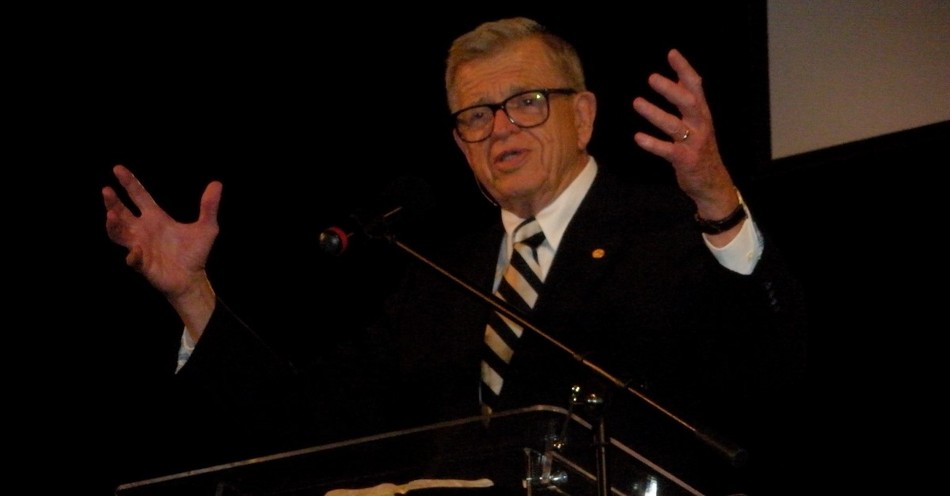Watch the classic political thriller All the President’s Men based on the Watergate scandal, and you’ll hear a slew of names integral to the infamous break-in. One name only appears a handful of times, but always with great weight.
Charles Wendell Colson, better known as Chuck Colson, served as President Richard Nixon’s special counsel. Chuck was not his best-known moniker. He was also known as “The Hatchet Man.” Coworkers within the Nixon administration called him the “evil genius.”
So how did Nixon’s Hatchet Man become one of the most outspoken names in Christian ministry—not as an evil genius, but as a servant of the Lord?
Important Events in Chuck Colson’s Life
Colson was born in Boston, Massachusetts, in 1931. After earning degrees from Brown University and George Washington University Law School, he served in the Marines from 1953-1955.
His legal aspirations came to fruition when he opened his own law firm in 1961. He quickly began participating in political campaigns, focusing on promoting candidates within the Republican Party. After working on Nixon’s successful presidential campaign, Colson left his law firm in 1969 to serve as Nixon’s Special Counsel.
For someone tasked with upholding the law of the land, Colson would eventually break the nation’s trust. During Nixon’s 1972 re-election campaign, five men broke into the Democratic National Committee Party headquarters offices to plant recording devices and photograph documents.
The break-in was a felony masterminded by Colson and other high-level White House officials. They took great pains to conceal their efforts, and hide the full story even after the five men were caught.
An investigation by Washington Post reporters Bob Woodward and Carl Bernstein blew open the case. As a result, Colson was sentenced to prison for obstruction of justice in 1974. He served a seven-month sentence in Maxwell Prison in Alabama.
How Did Chuck Colson Become a Christian?
History is rife with stories of individuals coming to Christ after facing the difficulties of prison. Yet Colson’s conversion story comes before he ever saw the inside of Maxwell Prison.
Breakpoint, a website maintained by the Colson Center, offers a transcript of Colson retelling the events that led to his decision to follow Jesus. It all began with a visit to Raytheon Company president Tom Philips. Colson was about to represented Phillips legally for the second time, but had other reasons for his visit:
“I knew Tom had become a Christian, and he seemed so different. I wanted to ask him what had happened.
That night he read to me from Mere Christianity by C. S. Lewis, particularly a chapter about the great sin that is pride. ‘A proud man is always walking through life looking down on other people and other things, said Lewis. As a result, he cannot see something above himself immeasurably superior—God.’”
Colson didn’t make it out of Philips’ driveway before breaking down into tears. He asked the Lord to come into his life as his personal Savior, but little did he know that night that the Lord would call him to do great things for His sake in the lives of countless others.
With a newfound faith in Christ, and feeling convicted about his involvement in the Watergate scandal, Colson did away with any cover-up strategy, instead pleading guilty to obstruction of justice.
What Did Chuck Colson Do After Prison?
Perhaps Colson’s most notable post-conversion contribution to society was the founding of Prison Fellowship, a non-profit organization that supports incarcerated individuals and their families.
When he was released from prison, he felt that God was calling him to do something to help those left behind. One of the organization’s guiding Scripture passages is Matthew 25:34-36, in which Jesus describes God the Father blessing those who care for the hungry, the sick, and the imprisoned, among others.
Prison Fellowship not only advocates for justice reform and helps wardens bring positive change into their prisons (most notably through Bible studies), but they also work to strengthen the bond between incarcerated parents and their children. Churches and other faith-based organizations are invited to participate in these efforts; for example, many churches display a Prison Fellowship Angel Tree at Christmas ;with gift ideas for children whose parents are in prison.
From the 1980s to his death, Colson used various media channels to address legal issues such as LGBTQ issues, abortion, evolution, and more. He wrote articles, was interviewed on radio and TV, and debated people with opposing views. Colson eventually started The Colson Center to help Christians evangelize and engage thoughtfully and constructively with the culture. He also began Breakpoint to share articles and podcasts from The Colson Center.
Colson received the prestigious Templeton Prize for Progress in Religion in 1993. He remained politically active before passing away in 2012.
10 Important Chuck Colson Quotes on Life and Faith
1. “I found myself increasingly drawn to the idea that God had put me in prison for a purpose and that I should do something for those I had left behind.” — Born Again
2. “I know the resurrection is a fact, and Watergate proved it to me. How? Because 12 men testified they had seen Jesus raised from the dead, then they proclaimed that truth for 40 years, never once denying it. Every one was beaten, tortured, stoned and put in prison. They would not have endured that if it weren't true. Watergate embroiled 12 of the most powerful men in the world—and they couldn't keep a lie for three weeks. You're telling me 12 apostles could keep a lie for 40 years? Absolutely impossible.” — “How Chuch Colson’s Legacy of Hope Lives On,” Prison Fellowship website
3. “‘I shudder to think of what I'd been if I had not gone to prison . . . Lying on the rotten floor of a cell, you know it's not prosperity or pleasure that's important, but the maturing of the soul.” — “Charles Colson: Watergate 'master of dirty tricks' became prison evangelist,” Christian Science Monitor
4. “I said it is wrong for Christians to allow themselves to become a special-interest group or a power block and thereby bargain to put themselves in the hip pocket of a political party or movement. It is equally wrong to ignore politics because we have to care deeply about it, but we stand independent of and apart from a specific political movement.” — “Preaching Christ to Culture: An Interview with Chuck Colson,” Crosswalk.com
5. “Work embraced as a calling expresses the glory of God, and it’s part of—very literally—following Jesus. Through our work God provides for us and for our families, contributes to the common good, and also gives us a sense of fulfillment and satisfaction. He has given us work as the way to fulfill His mandate to us as humans—to take dominion over the world he has created. As we work, we extend God’s reign and influence as his agents or stewards.” — “Your Work Matters: A Message from Chuck Colson”, Breakpoint
6. “Christianity is more than a relationship with Jesus. It is more than discipleship. It is a way of seeing and comprehending all reality.” — The Colson Center
7. “Do we have the courage to lay it all on the line? Do we have the courage to speak out for traditional marriage when we know we’ll be called bigots and worse? Or would you have the courage to stand up at a school board meeting and speak against a curriculum that indoctrinates kids and sexual license? You’d have to prepare to be shouted down. Believe me, it takes courage to take an unpopular stand and risk our popularity, our reputations, and maybe even lose a few church members.” — “Chuck Colson on Courage,” Breakpoint
8. “People who cannot restrain their own baser instincts, who cannot treat one another with civility, are not capable of self-government . . . without virtue, a society can be ruled only by fear, a truth that tyrants understand all too well.” — How Now Shall We Live? co-written with Nancy Pearcy
9. “How magnificently has God honored the covenant of our forefathers. How richly has he blessed our nation. So deep are our religious roots, but so far have we strayed.” — Born Again
10. “Some evangelists see converts as trophies in a big game hunt and measure their success by numbers; thus, they do not want to frighten off their prey. One Christian leader, asked why he never mentioned repentance, smiled and replied, ‘Get ‘em first, let them see what Christianity is, and then they'll see the need to repent.’ Tragically, this attitude pervades the church not only because we’re afraid the truth will scare newcomers, but because it might also drive a number of the nodding regulars right out of their comfortable pews.” — Loving God: The Cost of Being a Christian
Inspiring Movies About Chuck Colson
Several movies have been made either by Colson, or about him and his close associates:
1. All the President’s Men was adapted from Woodward and Bernstein’s 1974 book of the same name, and released in 1976. It dramatizes the Watergate scandal and the subsequent investigation. Dustin Hoffman and Robert Redford play Bernstein and Woodward. The movie may not feature Colson, but it shows the aftermath of his actions and how things disintegrated, the groundwork that led to his life changing.
2. Born Again was based on Colson’s 1976 memoir and was released in 1978. It dramatizes the story of Colson’s conversion and the subsequent five years of his life. Colson is played by former Disney star Dean Jones (later known for his one-man play about the last years of the apostle John).
3. Faith in the Big House, released in 2011, is a documentary looking at Colson and others who have started Christian ministries focusing on prisons.
10 Great Books by Chuck Colson
From books about his testimony to opinions on political and cultural issues, Colson wrote some excellent books that are worth exploring today.
1. Born Again
2. My Final Word: Holding Tight to the Issues that Matter Most with Anne Morse
4. Loving God: The Cost of Being a Christian
5 The Faith: What Christians Believe, Why They Believe It, and Why It Matters with Harold Fickett
6. God and Government: An Insider’s View on the Boundaries between Faith and Politics
7. Lies That Go Unchallenged in Popular Culture compiled by James S. Bell, Jr.
8. Being the Body: A New Call for the Church to be Light in the Darkness
9. The Good Life: Seeking Purpose, Meaning and Purpose in Your Life with Harold Fickett
10. Chuck Colson Speaks: Twelve Key Speeches by America's Foremost Christian Thinker
Chuck Colson was first known by the watching world as a political magnate who broke the public’s trust and paid for it. His vast knowledge of the law didn’t prevent him from thinking himself to be above the law. Yet the more compelling Chuck Colson is the one who went to prison for his crimes and, rather than write off the prison system after serving his time, used the experience as a powerful ministry tool. In other words, he let what could have been the most humiliating part of his life’s story act as a means to “free the captives” from spiritual confinement.
Photo Credit: Flickr/IFI-MO
Anna Oelerich is a Chicago-area church youth director, freelance writer, and graduate of Taylor University. She received her B.S. in Professional Writing in 2018, but has loved words—reading, storytelling, list-making, and even handwriting—for as long as she can remember. Previously, she served as the marketing and communications coordinator for a community foundation, where she shared powerful stories of generosity, and encouraged others to give. When writing an article, or developing programming for her students, Anna enjoys highlighting the historical and cultural contexts of familiar Bible passages so others feel they are living the stories for themselves.
This article is part of our People of Christianity catalog that features the stories, meaning, and significance of well-known people from the Bible and history. Here are some of the most popular articles for knowing important figures in Christianity:
How Did the Apostle Paul Die?
Who are the Nicolaitans in Revelation?
Who Was Deborah in the Bible?
Who Was Moses in the Bible?
King Solomon's Story in the Bible
Who Was Lot's Wife in the Bible?
Who Was Jezebel in the Bible?
Who Was the Prodigal Son?









